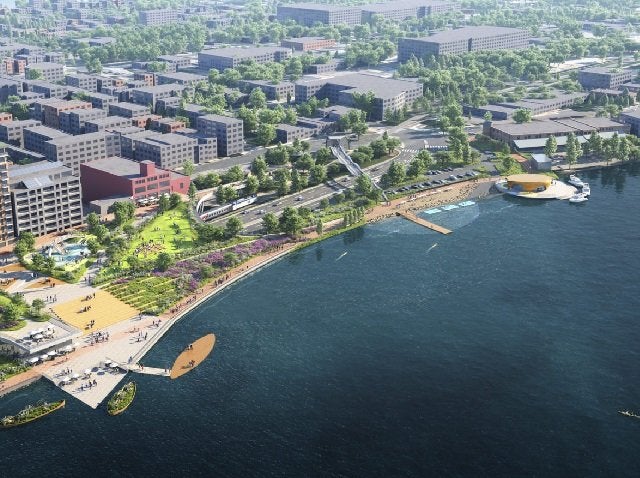Plans are moving forward to revamp the waterfront along Madison’s Lake Monona.
Phase 1 construction could begin as soon as 2025 on a redesign that backers hope will make nearly 2 miles of lakefront more hospitable to tourists, residents and even fish.
Last week, a citizen-led committee chose the Denver-based design firm Sasaki to come up with a revised master plan for the project. That plan will be submitted to the city’s Common Council in October, and could secure the Council’s approval before 2024, committee members anticipate.
News with a little more humanity
WPR’s “Wisconsin Today” newsletter keeps you connected to the state you love without feeling overwhelmed. No paywall. No agenda. No corporate filter.
The Lake Monona Waterfront Ad Hoc Committee gave Sasaki’s presentation the highest score from among a pool of three finalists, in part because of Sasaki’s environmental focus, said committee Chair Allen Arntsen.
“They really started with focusing on the health of the lake,” Arntsen said. “What will improve water quality? What will improve the shoreline? What will improve aquatic habitat?”
And, Arntsen said, committee members appreciated the firm’s ideas for acknowledging the contributions of the Ho-Chunk Nation, a tribe that’s lived for thousands of years in what’s now southern Wisconsin. Sasaki’s proposal included a “story walk” with quotes and graphics inscribed on walls and sidewalks to pay tribute to Ho-Chunk history.
Total redesign costs remain uncertain, but city leaders hope to leverage private donors along with state and federal funding. Although expenses could run into the tens of millions or hundreds of millions of dollars, Arntsen sees the project as an investment — one he says will especially benefit the city’s downtown and south side.
“The lakes are central to Madison, and this gives us a chance to make Lake Monona healthier, and it also makes the lakes accessible to the whole community,” said Arntsen, who’s also a board member with the nonprofit Friends of the Nolen Waterfront. “It’ll pay for itself in visitors and spending from people being attracted to the park in Madison.”
Sasaki’s suggestions include improving water quality and filtration through pervious pavement, wetlands, rain gardens and native plants. It’s also proposed an outdoor amphitheater, a community boathouse and space for food trucks. In all, the proposed redesign spans 1.7 miles of shoreline and 17 acres of lakefront.
The proposed redesign coincides with plan to reconstruct the heavily-trafficked John Nolen Drive, which connects north and south Madison across Lake Monona. Last month, officials announced Madison had received a $15 million federal grant to rebuild bridges as part of the $30 million project.
Last summer, the ad hoc committee chose Sasaki, Agency Landscape + Planning of Cambridge, Massachusetts and James Corner Field Operations of New York City as the top contenders after 14 firms responded to the city’s request for proposals. Among those finalists, Sasaki consistently came out ahead in community surveys.
Each finalist organization received a $75,000 stipend to cover the costs of coming up with a preliminary presentation. And, as a result of that stipend agreement, the city nows owns the intellectual property behind all three proposals, which means Madison could incorporate aspects from any of those plans, Arntsen said.
The city funded half of those design challenge costs, with the remaining portion covered by private donors through Friends of Nolen Waterfront. Additionally, the city has set aside $200,000 in local funding to pay Sasaki for creating a revised master plan. The ad hoc committee is continuing to collect feedback, with its next public meeting on May 30.
Wisconsin Public Radio, © Copyright 2026, Board of Regents of the University of Wisconsin System and Wisconsin Educational Communications Board.
